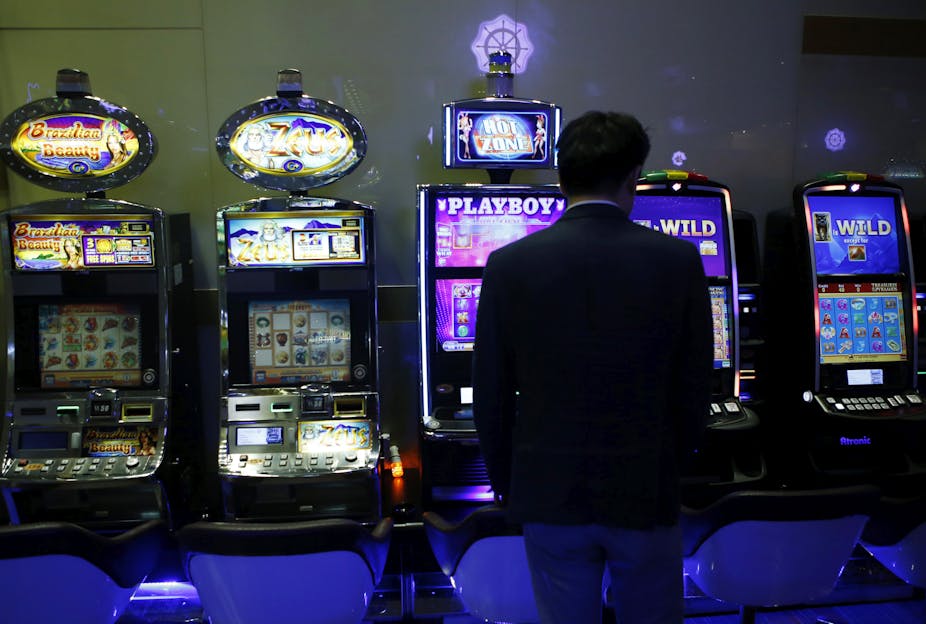A 2011 Massachusetts law allows for the expansion of gambling, including slot machines. That law is now on the November 2014 election ballot for potential repeal.
This is a real opportunity for voters to consider where slot machine income comes from. Also, since slot machines are the most addictive form of gambling, Massachusetts voters should consider the source of gambling revenues, and whether slot machines are fair to gamblers. Let’s see what current research shows.
Slot machine profits
The industry estimate for slot machine “profits” is around $100,000 per machine per year of player losses. (See, for example, slot machine revenue in nearby Connecticut.)
These losses add up fast. A gambler who plays for just three hours one evening per week, and makes fairly small wagers of $1 per spin, would lose approximately $1,000 per month, or approximately $12,000 per year, on average.
This is a very high cost of entertainment for what would appear to many as a relatively low wager per spin and relatively small number of hours per week. For many patrons casino gambling is much more expensive than going to big-name concerts or professional sporting events such as the Red Sox, Bruins, Celtics, or Patriots.
Of greatest concern are players with a gambling problem, or those who may develop a problem in the future. Approximately 50% of slot machine revenue is derived from players with moderate and severe gambling problems, who make up only 3%-4% of the general population.
Such players have very high losses which cause very significant negative consequences for them and their families. In the extreme cases, such as Scott Stevens of Ohio, things can quickly spiral out of control.
Stevens’ case is particularly tragic: he embezzled from his employer and eventually committed suicide. He was a husband and father with a senior role in accounting and no known problems aside from gambling. But once he started playing slots he couldn’t stop.
Characteristics of slot machines
Slot machine manufacturers design the gambling experience to confuse and manipulate players’ emotions in an effort to keep players gambling. This is called maximizing ‘time on device’. Many of these manipulations are not readily revealed to the player. Here are some examples drawn from my research:
The cost of play of slot machines is hidden from the player. An estimate of the per-hour cost is 50 to 100 times the cost of a single spin, but this varies depending on the settings of the game.
Worse yet, the same game may be on multiple machines in a casino and programmed to pay out differently on each. Thus, even if a player knew the cost of play on one machine, that knowledge would not necessarily transfer to the same game elsewhere in the same casino. Players start to incorrectly guess how slots work and guess at the chance of making money by playing the machines. Obviously, there is randomness involved in how much a player loses at any given session, but slot machine players cannot even predict how expensive a session might be.
On modern slot machines, half of ‘wins’ are actually net losses. An example would be a $1 bet with a 30¢ payoff. This is a loss of 70¢, but the machine shows bright graphics and makes sounds announcing a win. Researchers call these events Losses Disguised as Wins (LDWs) and have clearly shown that players experience these as actual wins, giving the players the (incorrect) positive feelings that they are winning. Players who have many losses-disguised-as-wins overestimate the number of actual wins they receive in a session: they psychologically encode these net losses as actual wins.
Slot machines create ‘near miss’ outcomes: losses that appear close to jackpots. One trick to make this happen is to have the jackpot symbol to be surprisingly rare on the final reel. Near misses lead to prolonged play, and heavier losses.
Loss disguised as a win for states?
There are also serious concerns about the financial aspects of slot machine facilities, particularly if slots are being claimed to be bringing good revenues into a state’s treasury.
For example, at many casinos slots players can apply for a loan. This seems predatory on the casino’s part as the casino knows that the player is out of money, and yet the casino lends the player money to gamble, knowing the player will likely lose that money back to them. Such predatory lending should be forbidden.
Finally, research shows that bringing casinos with slots to within 30 miles of major cities will usually boost the number of people with a gambling problem in that city. The best current research shows that introducing slots to Massachusetts, without working to ameliorate their harms, will have a high potential for causing significant negative effects on communities in the Commonwealth.
_This article is part of a series on gambling in America. You can read the rest of the series here _

